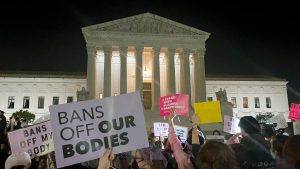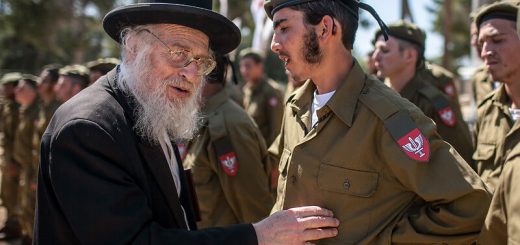Cheerleading Rarely Helps

Rabbi Michael J. Broyde
Dear Rabbi Adlerstein,
There is so much truth in your open letter. Thank you for writing it.
Like you, I am grateful for our friendship and the ability to be civil even when we do not agree. I agree with you that our community is made weaker by the lack of polite discourse between opposing sides, particularly when the disagreement is about tactics or even strategy, but not core Torah values.
In truth, your comments about my article are correct on many levels. I share four ideas that I have, and that you criticize me for.
- I work not to show emotion when dealing with public policy rather than with actual people, because emotions lead to bad policy. I am a dead fish on public policy, but only on public policy. And I am proud of it – people deserve emotional support and policy needs analysis.
- Many people did not cheer the fall of the Czar, since they intuited that what would come next would be worse and not better. I did not cheer the downfall of Roe, because I worry the change is bad for the Jewish people on a whole. Not because Roe was correct, but because what comes next might be worse, I fear.
- I made clear in the article what I think is a better policy on abortions than Roe, which is ethics panels; the mere act of having to ask, even if the panel permits over 90% of abortions, will reduce the overall number. This system is already in use in many Western nations, Israel included, and reduces un-needed abortions, which is what Jewish law wants. No matter how passionately I might have presented the idea, people who do not want to hear it would not hear it.
- With Roe overturned, I foresee a state-by-state battle; in a highly polarized time, that repeated drama will damage the Jewish community as it engages in it and will produce bad policies for us. Furthermore being part of that battle — never-mind cheering as your favorite side triumphs — is not mandated by halacha.
Allow me to explain my first three comments – I think my final one is obvious and needs no more. Your crucial paragraph is:
For what it’s worth, I think that your essay omitted crucial elements in guiding people towards an intelligent position regarding abortion and its jurisprudential fortunes. I believe that you minimized the responsibility of Torah Jews to make Hashem’s will known to anyone listening. I also believe that you ignored affect – what Jews are supposed to feel when they witness departure from His dictates, and what should be going on internally when they see people moving closer to the way Hashem wants them to live.
On the abortion issue, I do not see how “maximizing” the responsibility on Torah Jews to make God’s will known, will contribute to progress towards “an intelligent position regarding abortion and its jurisprudential fortunes.” The jurisprudential fortunes of abortion are not hinged to God’s will and ought to be shared in other ways. Let me explain:
First, I do not think secular law is a good vehicle for sharing our vision of what God wants generally. I am particularly sure this is so in abortion jurisprudence, because what halacha wants of Jews differs in the view of so many poskim from what it wants of non-Jews; furthermore, there is significant debate about when non-Jews are no longer allowed to terminate a pregnancy according to Noachide law – no less a figure than Rav Ovadiah (Yabi`a Omer Even Ha-Ezer 4:1) indicates that abortion is seemingly only prohibited to Noahides beginning in the second trimester (and over ninety percent of abortions happen in the first trimester!).
Second, the use of secular law – which is coercive and not merely informative – creates an environment of using the law to force “our” values on others, which is not a great model for a minority religion like ours. That was Rabbi Feinstein’s repeated point as I noted in my Lehrhaus article, with which I deeply agree. As members of a minority faith, I think we should all favor policies that do not empower the majority to coerce private moral decisions, even if any given decision might seem to be morally proper in the short run.
I think my friend Rabbi Yonah Reiss, Av Beis Din of the Chicago Rabbinical Council, expresses the contrary view better than I could, and more concisely. He writes:
I think that our main concern as Jews must be that we be able to practice our religion freely. There is no right to abortion in Jewish law, but there are cases, such as when a mother’s life is in danger, when an abortion is unfortunately necessary, and there are other cases, depending upon the stage of pregnancy and the medical or psychological issue in question, when a rabbinic authority might rule that an abortion is permissible. We would want to maintain our religious liberty to implement any such lenient rulings when applicable, and of course to adopt a stringent stand against abortion in cases when it is prohibited according to Jewish law, such as by declining to participate in a procedure that we believe is forbidden. I also believe that it is desirable from our perspective for non-Jews to take seriously the prohibition against abortion that exists for them as well according to Torah law, but that is true regardless of the Supreme Court decision.
I worry that the reaction you had in your article, that many Orthodox Jews have, is about values-signaling more than the policy issues. You have the chance to make clear where your heart lies, without any impact on the important moral game being played out, that will now be played out in state after state, with many of those states likely to take an absolutist stance very much at odds with an halachic perspective.
I think that public policy cheerleading — cheering on policy decisions because that gives us a chance to make a moral point we could not have made otherwise – is rarely effective as a way to reach better outcomes. Many years ago, the judge I clerked for – the great Circuit Court Judge Leonard I. Garth (yes, the same judge as Justice Alito clerked for) — once said “cheerleaders are fun to watch, but they do not win football games.” Do you think the column you wrote, or the Dobbs decision, brings us closer to where Jews or Gentile — who did not until now care to fulfill God’s will – will choose to fulfil God’s will?
Those who celebrate Dobbs seem to me to laud winning now, without paying attention to the long term complexities it started, with losses sure to come. Not to speak of the restrictions it is likely to place on Jews doing what halacha recommends in countless cases. I rarely view coercing people to do God’s will to be a win, and this is even more so true when Jewish and Noachide law is as complex as this area, and this is ever so more true here, where our religious freedom to do as our faith recommends will be diminished.
With friendship and all the best, from your cold Litvak, who wants to follow the will of God, but feels no need to cheer this Supreme Court decision.




What ever happened to the concept of keeping a low profile in galut? What is the intended result of after the fact cheerleading? We’ll see how both Dobbs and Kennedy play out – be wary of Rich’s rule unintended/ unforeseen consequences.
KT
1) That only worked when there were no people looking over your shoulder, with the expectation that the protectors of Biblical morality would certainly have something to say. Keeping a low-profile is the lechatchila, which is why the Aguda statement was low-key and expressed judiciosly.
2) Cheerleading, as Rabbi Broyde delightfully calls it, does not have to be on camera. I’m worried about those in the Orthodox world who don’t even think of factoring in Hashem’s expressed will in our reactions to world events, even in the conversation that goes on within our own walls.
Why shouldn’t our response be to document exactly what halacha demands of us and what the sheva mitzvot demands of non-Jews?
KT
1) Because no one would listen
2) Because we ought to be doing more than that. We should be clarifying the moral issues involved in the Authority vs. Autonomy wars
But once again, there is another issue that stands apart from what we tell the world: What we tell ourselves. And if we were a bit more confident in that issue, it might help us better formulate what we tell others
One may well- and even better- ask the same question of “Orthodox” and other Jews very loudly and publicly pushing for unlimited abortion to remain legal using an imaginary concern of halakha as a cover.
There is a huge difference in “very loudly and publicly pushing for unlimited abortion to remain legal using an imaginary concern of halakha as a cover” and the above stated comments of R Yona Reiss.
With all due respect to Rabbi Broyde, but “celebrating” the Dobbs decision is hardly cheerleading.
As a friend of mine, a contractor, once told me. “Originally i thought that i would spend a fortune on advertising in the beginning of my career, work super hard to build up a great name for myself and then get jobs solely through word of mouth. Unfortunately, as hard as i worked there were those who were unfairly critical of my work and told others bad things about my work. Many years later i still must advertise. Not to get my name out, for people know about me, but to counter the negative reviews that I’ve gotten.”
In todays word where things that were considered insane and crazy a mere 20-30 years ago are now totally accepted and even encouraged, we cannot stay silent. The world in general and the internet in particular is filled with convoluted ideas on life, gender, government, law, and many other fields that clash with what we know is the truth and what is positive for people both this world and the next. It is essential for someone, anyone, to publish the proper viewpoint on these topics to show people who care to think and investigate the truth of what is the right way to view these subjects. Without this, people will turn to poisonous sources that corrupt their whole worldview and may lead to terrible results.
In short, an article lauding a proper decision by a conservative court is not necessarily to push our views on others but to prevent them from taking the views of the evils ones who push everything that is against the will of H-shem and his Torah. As for the fear that it will lead to bad rulings for the Jewish world in the future, it is hard to believe a few statements of a few Orthodox organizations and Rabbi’s will have any impact on those rulings. And even if this is so, we cannot concern ourselves with a Safek in the future while we have a Vadai to deal with now.
I have a question that can shine a light on Rabbi Broyde’s public affairs acumen: Whom did he support for President in November 2020 and why?
The other question is: In the face of the mass obliteration of the unborn in recent years, when and how did Rabbi Broyde speak out publicly on the topic?
R Broyde has staked out what is clearly an intellectually honest position and in so doing has set forth the Chilukei Deos (differing views ) of the Poskei Zmanenu on this isssue . WADR if you compare the public statements of Agudah and CJV, with the OU, Agudah and CJV seem to be rejoicing , and the OU clearly more nuanced in stating that there were Chilukei Deos that because of our adherence to TSBP clearly were not in congruence with the right to life and/or unrestricted abortion movements.
Perhaps one should look at this linked articlehttps://forward.com/life/406674/orthodox-jewish-women-abortion-stories which are reported from mainstream Orthodox communities in the Charedi and MO worlds in the US and Israel / R Broyde deserves a Yasher Koach for pointing out that there are different views among Poskim that the women in this article were aware of
The reason to cheer it is that potentially thousands of Jewish nefashos will be saved.
Many leading Modern Orthodox Rabbis and Organizations were part of the original pro-life movement fighting in response against the 1970 NY abortion law, and for legislative vote repealing it two years later.(Vetoed by Gov.Rockefeller)
In 1970 when NY was voting in favor of abortion, Nash Kestenbaum, then president of Young Israel , personally lobbied against the pro abortion law. Right after the law was passed, Rabbi Joseph Karasick,president of the OU, and Rabbi Bernard L. Berzon, president of the Rabbinical Council of America, issued a statement jointly stating “In Judaism, the life of an unborn child is sacred, and only when It is a threat to the mother can the moral issue of abortion be resolved. For each person to decide arbitrarily, on the basis of economics or convenience, whether a fetus is to survive is literally for man to play God and is religiously blasphemous and socially destructive.”
In 1972 the RCA’s policy‐making executive board of 80 members unanimously urged repealing of NY’s abortion legalization law . These were Rabbis who had been practicing when abortion had been banned and, based on their actual experience with abortion bans, did not share contemporary panic over the potential that abortion ban would limit halachically acceptable abortions.
Rav Moshe Feinstein, conducted himself in accordance with that view. In 1970 as referenced earlier, New York State became the very first state to legalize abortion [in a move that led to Roe v. Wade 3 years later]. In 1972 New York State Legislature voted to repeal this new liberalized abortion law, which was subsequently vetoed by Governor Nelson Rockefeller. During the row to repeal it , Rav Moshe Feinstein personally called up the Lower East Side State Senator Paul Bookson, who had voted for the 1970 abortion law, and told him to switch and vote to repeal the law.
Furthermore in the late 1980’s, when it appeared that Roe might then be overturned, and hundreds of thousands of people protested to preserve abortion- Rav Aaron Soloveichik referred to those protesters as “pagans” .
IMO, the Dobbs decision has little to do with the legality of abortion. Now that Roe is overturned, blue states will still allow it with no restrictions. If Roe had not been overturned, red states would have continued to place restrictions on abortion, practically making it illegal to get an abortion. The Supreme Court could have upheld those laws without overturning Roe, as Roberts indeed tried to do in Dobbs.
The importance of overturning Roe is that it restores the proper textual understanding of the Constitution. Made-up doctrines do not override the simple meaning of the text, and new rights cannot be invented out of thin air. The founders put a lot of thought into creating a government that would allow religious and other minorities to practice their faith without interference from the public.
The same type of thinking that let the Supreme Court in Roe could have just as easily let them a right of the infant to not be circumcised. Or the right of homosexuals to have their unions recognized by religious institutions, otherwise they lose tax-exempt status. Or to force schools to teach topics such as Queer Gender studies. Now that the court has said it cannot make new rights out of thin air, we can breathe a little more freely. Our First Amendment rights will not be wiped away by judicial legerdemain.